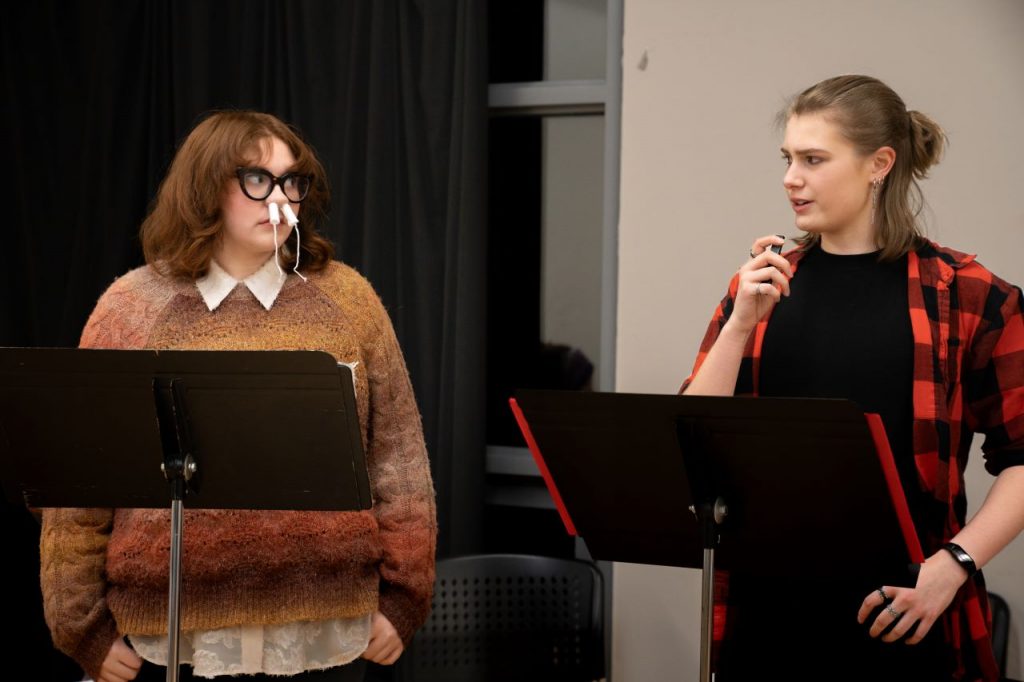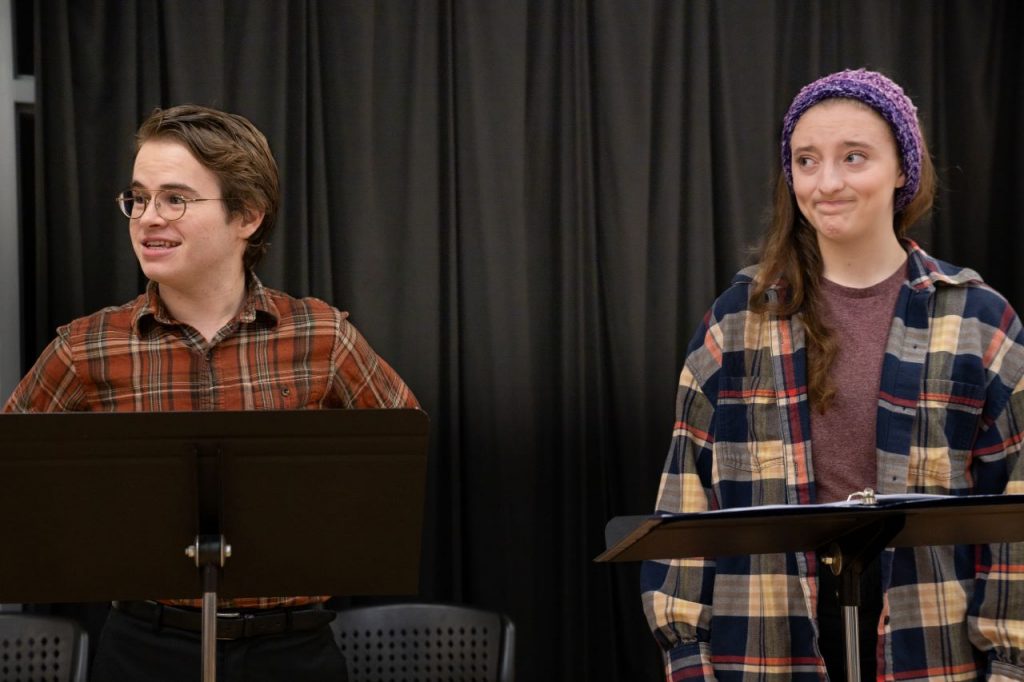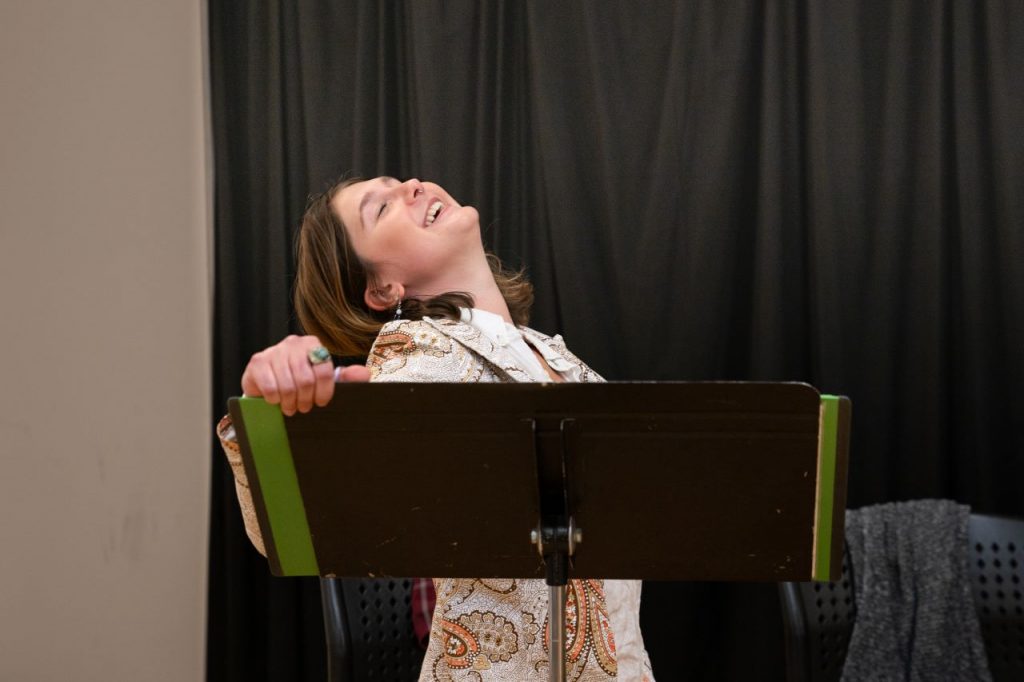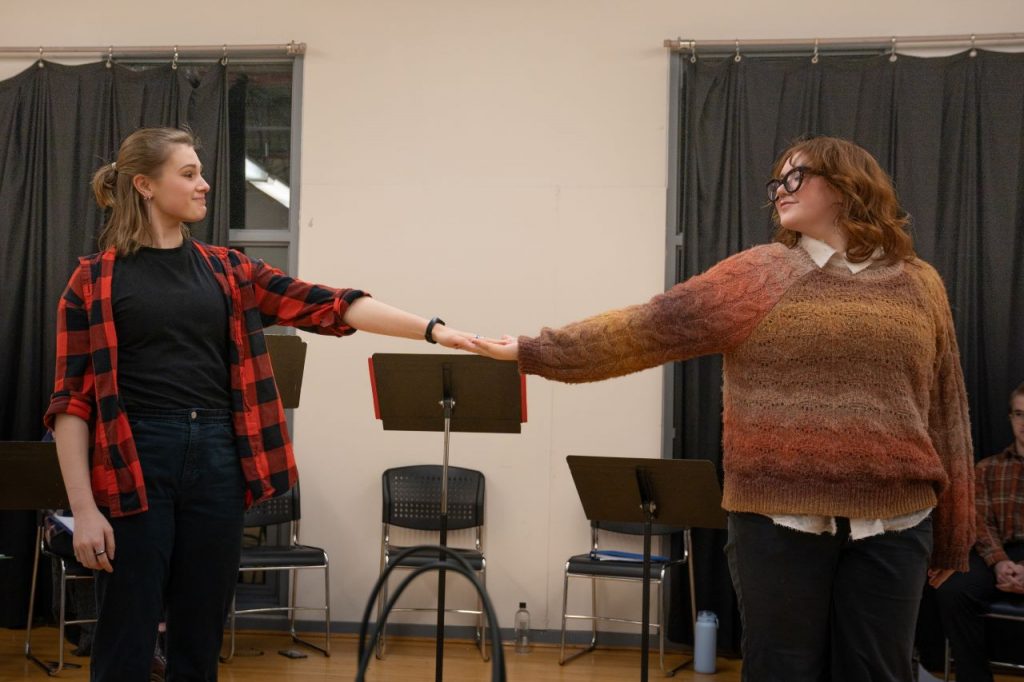BY KIERSTEN SIMPSON ’27

Max McGuire’s (‘24) Preaching to the Choir, which played in Skidmore’s Studio B on September 25th and November 13th, follows a group of queer art students as they navigate being queer in small-town Connecticut during the Trump administration. Together, they form a found family of sorts, one that is based on being their authentic selves and caring for one another.
The play follows an ensemble cast: at the center is Margot Dawson (Sophie D’Amore ‘26), an anxious girl living in her sister’s shadow. At her sides are her two closest friends, the highly-strung Jimmy Sinclair (Taylor LeClair ‘27) and the vivacious Chloe King (Lily Forbes ‘26). Other members of the choir include “social lesbian” turned proud bisexual Katie Prudence (Willow Forbes ‘26), kindhearted Amelia Segal (Naomi Wagner ‘26), Mama’s boy and deeply closeted homosexual Daniel Ziegler (Tom Wilkens ‘27), and badass object of Margot’s affection Ellie Carlson (Ken Caron-Quinn ‘27 in November, Victoria Calabrese ‘24 in September). Leading their choir is the ultra-conservative, over-the-top Ms. Mariana Ziegler (Lucas Falick ‘25). Over the course of the play, the choir is forced to put up with Ziegler’s controlling nature and inability to accept her students for who they truly are.

The play opens on a familiar sight for former arts kids everywhere: a high school choir room. Inside sit the members of the Rosewood High Choir, who are rehearsing for their annual Winter Holiday Pageant, despite it only being September. The students are exhausted; they’ve been rehearsing for two hours, have missed lunch, and have officially cut into thirty minutes of the next class. This is where the first moment of contention between Ziegler and her students occurs after she makes an off-kilter comment about Jesus not being the one Jewish student in the class’ lord and savior. It is at this point that it becomes clear to the audience what the dynamic between the choir and Ms. Ziegler is. She is allowed to push them around, even when they protest. The choir disperses after they eventually wear Ziegler down, but Ziegler holds Margot back.
Margot and Ziegler discuss the upcoming auditions for regionals, with some debate. Margot is concerned that she doesn’t sing opera, but Ziegler reassures her that that is okay, because Margot’s older sister Veronica was an alto who was able to sing classically with enough practice. The scene ends with Margot caving into Ziegler’s request, but not without doubt.
Afterwards, we transition to the lunchroom, where we see a crew of the choir kids eating lunch together. This is a moment where McGuire’s conversational tone thrives. They can capture with near 100% accuracy what most queer lunch tables sounded like in 2018; jokes about Troye Sivan, the one straight friend being secretly queer, and laments about crushes fill the text. It is in this moment that I am transported back to my 2018 middle school lunch table, where we loudly gossiped about everyone we knew and made jokes about 2018 queer culture.

The Rosewood choir’s conversation takes a turn when Jimmy runs into the lunchroom, announcing, that, after an encounter in the bathroom, Daniel is definitely gay. This conversation is one that adds a lot of nuances to the play; there’s a collective feeling—between characters and the audience—that, despite how clearly and stereotypically gay Daniel is, the secret of his sexuality must be kept close. Daniel’s mother is visibly bigoted, so it makes sense that the choir as a community feels inclined to protect him. On the one hand, the vast majority of characters have a general dislike of Daniel, but on the other hand, they would hate to see him hurt in any way.
Daniel’s closeted behavior does become problematic as he hunts for a beard—a person he can pretend is his romantic partner in order to conceal his homosexuality. He lands on Amelia, another choir member, and kisses her on Halloween night at a school dance. Daniel’s mother finds out and, to save face, Daniel decides to tell her they are in a relationship. The key problem here is that Amelia is asexual and has no interest in Daniel.
Daniel’s faux attraction is not the only piece of drama divulged at the dance; in a split scene, Katie realizes that she’s not in fact a straight girl who kisses other girls while drunk, but is bisexual. It also becomes apparent to the audience that Ellie and Margot are attracted to one another.

The Halloween dance sets up most characters’ arcs over the course of the second act incredibly well. We watch Chloe and Margot begin to start hanging out less and less, as Margot chooses to hang out with Ellie instead. As this is occurring, Daniel and Amelia are struggling with guilt caused by their fake dating scheme, and Katie is going on a journey of self-discovery upon realizing she is attracted to women, resulting in one of the funniest moments in the play wherein Katie declares to her peers that she is dawning a flannel because “that’s how Tumblr told her bisexual people dress” (McGuire) It is in the second act that the play feels most like an ensemble piece; every character is given their time to shine and given weight, which is always delightful to watch from an audience perspective. If you had a favorite character in Preaching to the Choir, they undoubtedly had a moment to shine in the play’s second act.
At the core of the play’s second act, though, is a conflict regarding the school’s annual Valentine’s Day talent show. Margot wants to perform an original song that she wrote in regards to her crush on Ellie, but Ms. Ziegler refuses, arguing that it’s nothing but a “sad lesbian power ballad” (McGuire) As this is occurring, Ziegler is also forcing Amelia and Daniel to perform “Suddenly Seymour” from Little Shop of Horrors alongside each other, something that neither have any interest in doing. There’s also drama regarding Chloe and Margot’s yearly tradition of doing a dance to “Toxic” by Britney Spears together.

Of course, it is the group’s care for one another that saves the day. Katie takes Margot’s place in the dance, Jimmy saves the day when Amelia runs off in the middle of the duet, and during intermission, the gang locks Ms. Ziegler in a closet, allowing Margot to perform her ballad—an original song written for the production by McGuire and performed beautifully by D’Amore. It is a moment of group solidarity that is comforting to watch.
Preaching to the Choir feels like a love letter to being gay in 2018. It’s a very niche thing to write a love letter to; but as the jokes about Tumblr, Troye Sivan, and The Perks of Being a Wallflower pile up, it becomes impossible not to look back on the era with a nostalgic gleam alongside the characters.
Photos by Coltrane Cho ’24
***
Kiersten Simpson ’27 is a staff writer for the Skidmore Theater Living Newsletter
